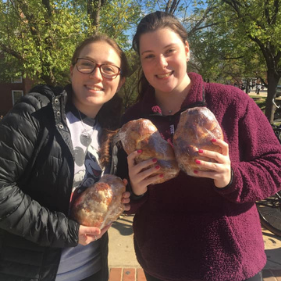Challah for Hunger

During a typical school year, students at the University of Maryland would braid challah together each week with Challah for Hunger. Social fraternities, service groups, and professional fraternities alike braid three snake-like, doughy strands into a challah that is sold around campus to raise money for Swipe Out Hunger and DC Central Kitchen.
“I love how happy it makes people,” said Anna Kaplan ’21, one of the co-presidents of the UMD Challah for Hunger chapter and an active Hillel member since her freshman year.
While the bread is made, the group discusses food insecurity. Kaplan leads interactive educational experiences on the topic. She uses a fill-in-the-blank prompt on the whiteboard to ask fellow students whether they know what proportion of U.S. households are food insecure: “_ in 4.” This encourages students to guess the statistics, and as they arrive at the truth together—1 in 4 households in the U.S. are food insecure—they begin to understand why certain stereotypes exist.
Challah for Hunger chapters across the nation are creating a communal space for all students, while fighting food insecurity on campuses— a reality that 39% of college students now face. With food insecurity among college students on the rise due to the pandemic, Challah for Hunger launched the FUEL Higher Education campaign this year to fight food insecurity on both the national and local governmental levels. Challah for Hunger also powers the Campus Hunger Project Podcast, which interviews students across the nation about their experiences facing food insecurity and advocating for change.
On many campuses, Hillel and Challah for Hunger work together to form a larger community that advocates for change.
“Challah for Hunger Harvard wouldn’t be able to function without Harvard Hillel,” said senior Noah Epstein, who is the chapter treasurer and on the Hillel undergraduate board. “It’s such an important relationship!”
Challah for Hunger Harvard is an affiliated group of the University’s Hillel. People come together in the Hillel space to bake weekly.
“I love the feeling of family and community that Hillel brings me,” said Allie Dodson ’22, who is an engagement intern with Hillel and on the Challah for Hunger board at UC Davis. “Challah for Hunger is important to me because food insecurity is a fundamental social justice issue ”
At UC Davis, Challah for Hunger does its baking in the Hillel kitchen. Students also sell the challah out of the Hillel house, and the two organizations do joint events throughout the school year.
“Recently we had a Challahween-themed Shabbat where some Challah for Hunger members spoke at Hillel about food insecurity,” Dodson said.
The two groups also host an annual French Toast Fundraiser: $5 per-person for all-you-can eat Challah French toast and the chance to win gift card that local businesses contribute.
“It’s a really great way for the community to band together to fight food insecurity,” Dodson said.
And overall, it is that community aspect of Challah for Hunger and Hillel that students seem to relate to the most.
“Having Jewish communal spaces that are open and accessible to everyone regardless of Jewish background or education is important to me,” Epstein said. “You don’t have to know Hebrew to bake challah.”
People outside of the Jewish community feel welcomed as well.
“I love the physical act of making the bread. Something about being in the kitchen with your friends and baking together has a way of melting away the stress of the week,” Dodson said. “I’ve been deeply involved with both Challah for Hunger and Hillel despite not identifying as Jewish. It’s really shown me, coming from the outside, how incredibly welcoming and accepting the Jewish community is.”
Now, during the pandemic, Challah for Hunger chapters are continuing their education and advocacy remotely. Kaplan said the University of Maryland chapter created three Zoom events for the fall semester, with the support of Hillel and organizations like the Food Recovery Network. The series will focus on what food insecurity is, destigmatizing the issue, and advocacy.
At Clark University, students join together bi-weekly to discuss food insecurity. The group, which is an affiliate of ClarkU Hillel, recently wrote an op-ed for their school’s newspaper, The Scarlet, about Clark’s food provider and food justice for students.
“Even with our small campus, the coordination between Challah for Hunger and Hillel has led us to be able to plan a lot of events and form a great group of students who are excited about tikkun olam in our community,” said Ari Hoffman ’21, secretary of ClarkU Hillel.
Challah for Hunger and Hillel International are coming together on November 16 to discuss food insecurity and how college students can make a difference on their campuses. The event will be live on Instagram, and there will be time for questions from the audience.